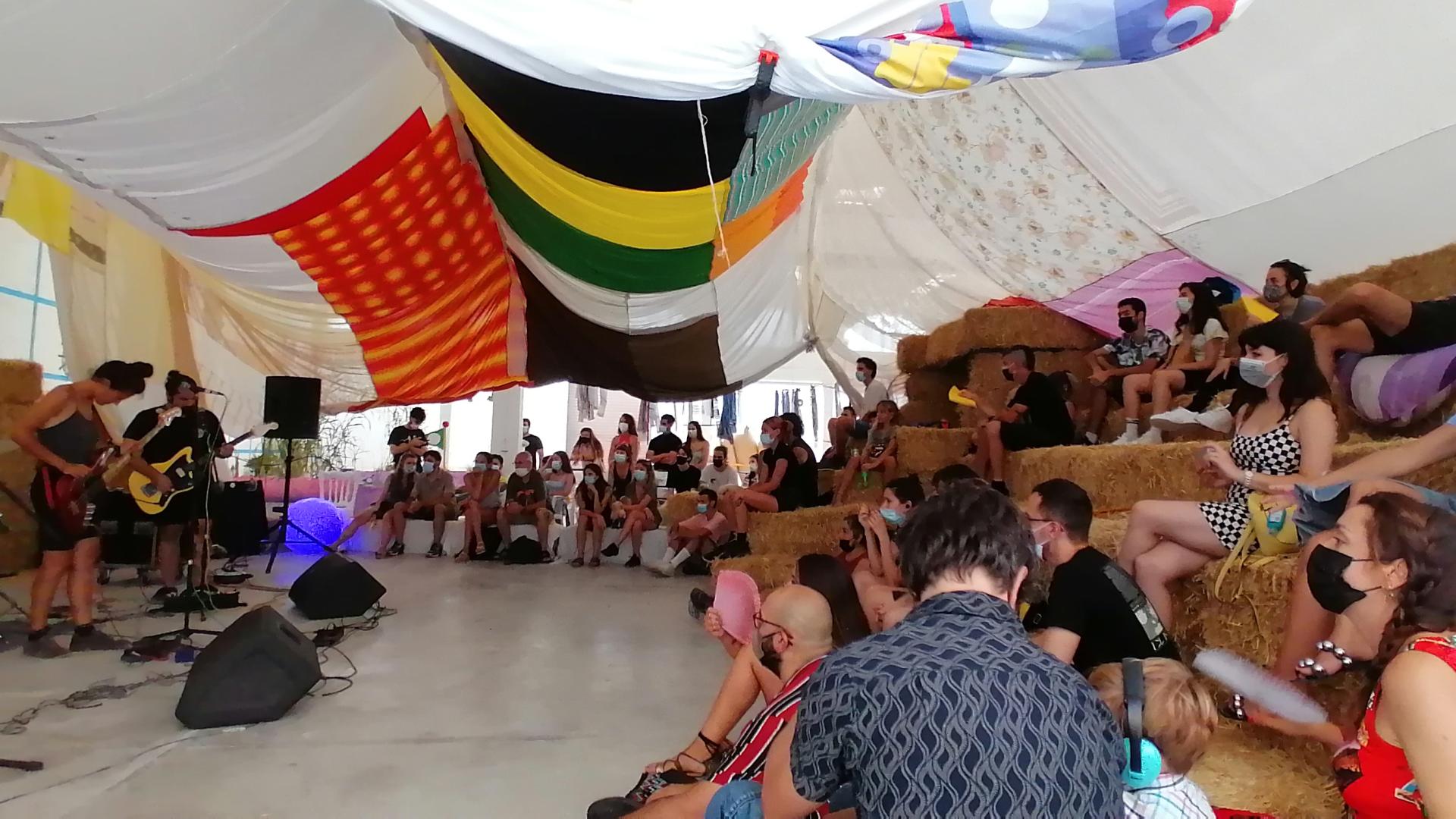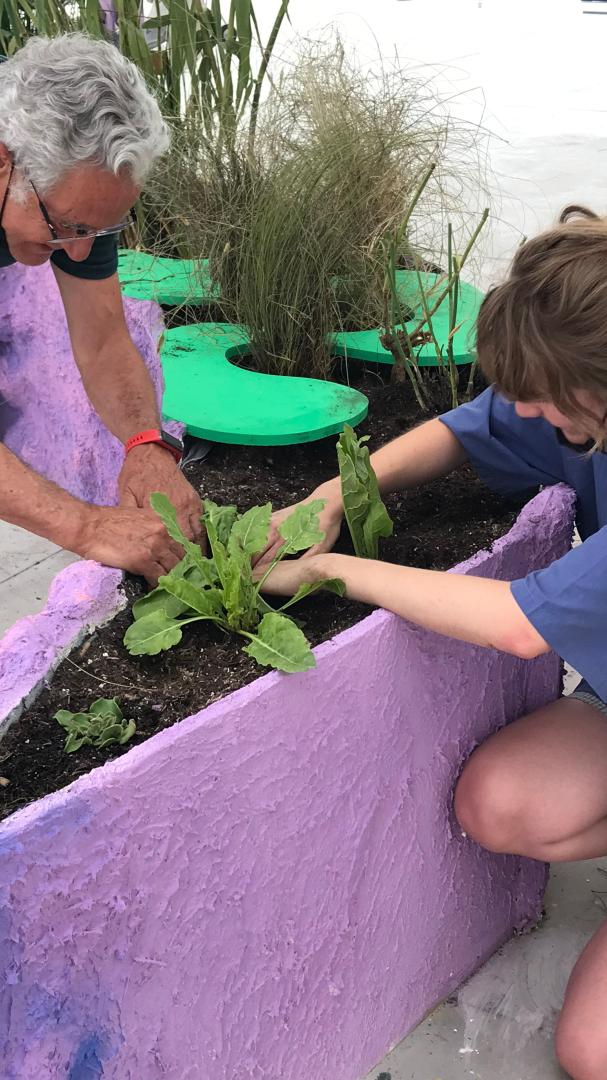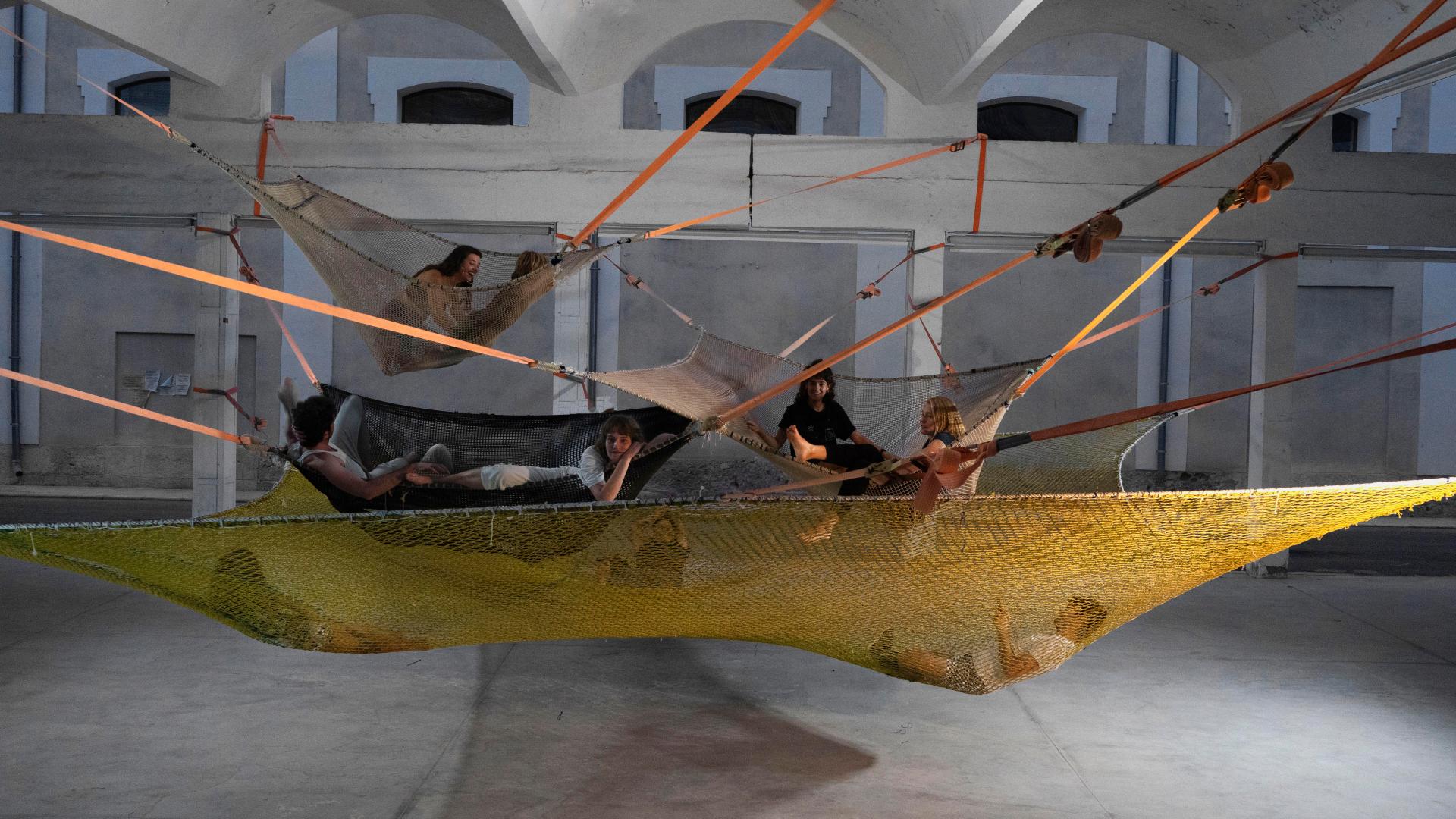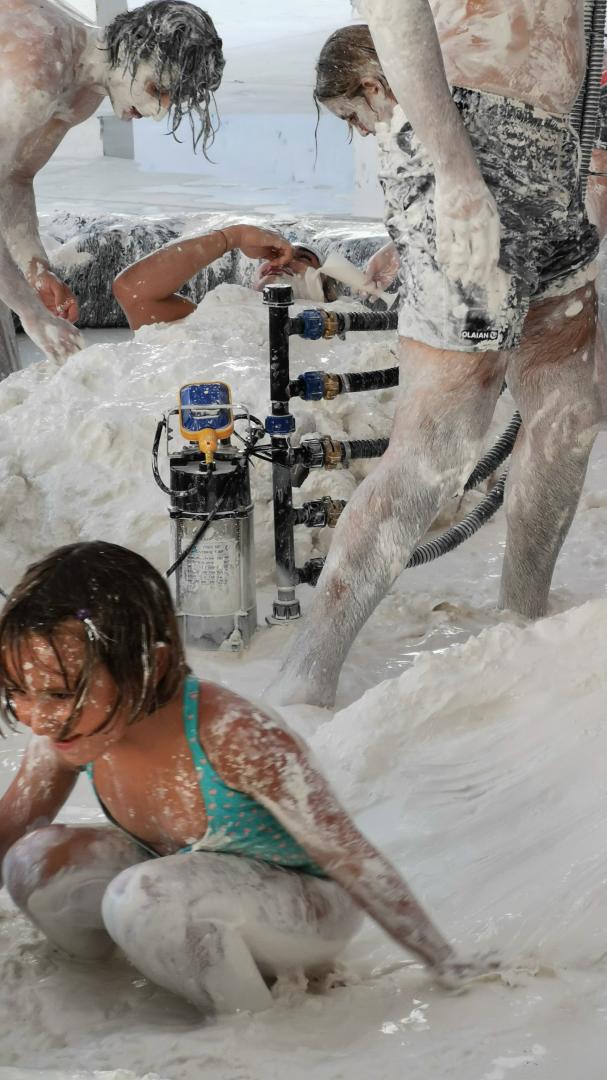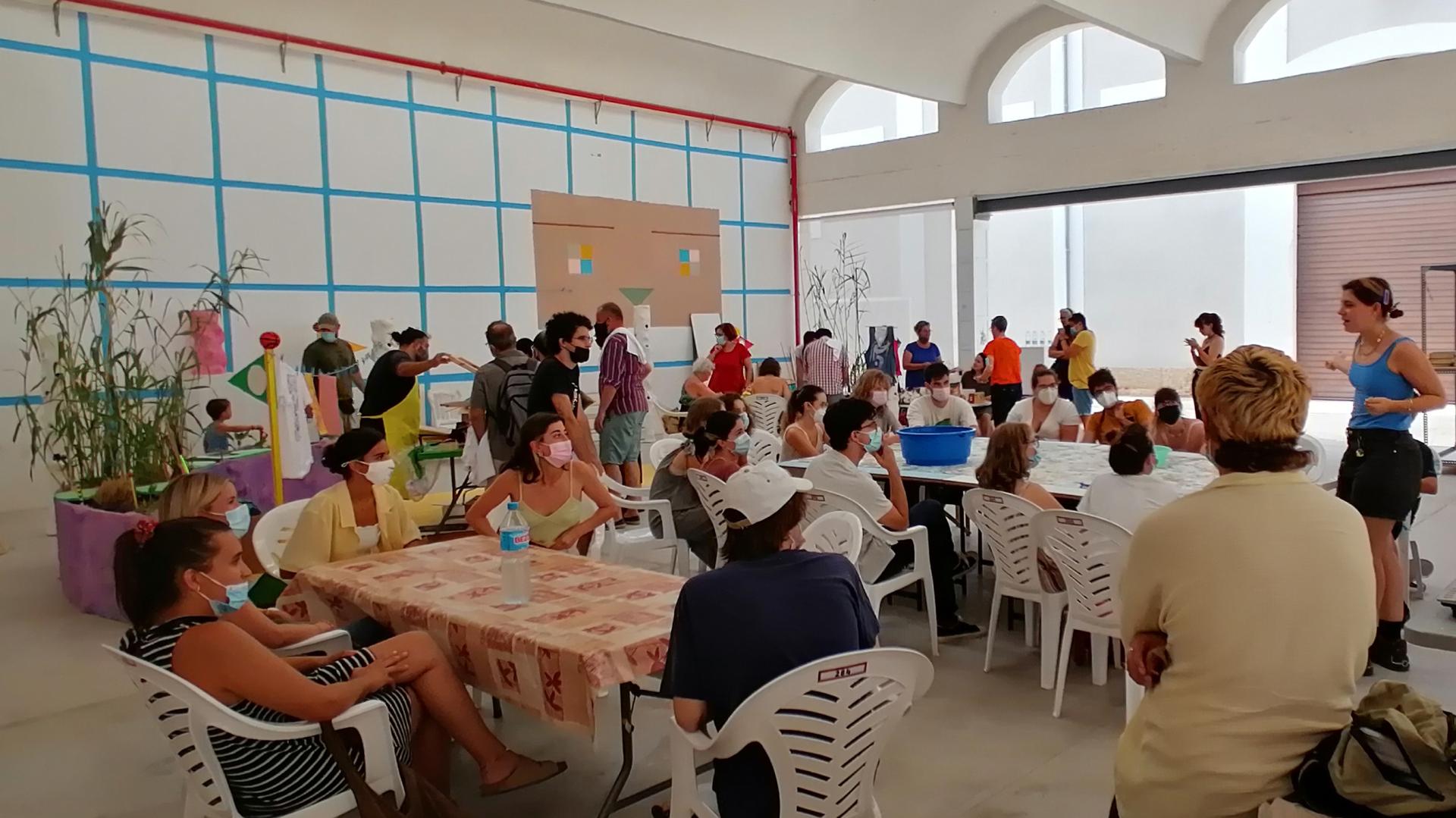Shared Fictions
Basic information
Project Title
Full project title
Category
Project Description
Through Shared Fictions, the old Tobacco Factory of Alicante became a meeting place for neighbours, ecologies and cultural policies. A summer programme embedded in its immediate territory, transcending the physical limits of the cultural centre but also of what we understand as a city. This programme combined habitat with encounter; learning with enjoyment and hedonism with commitment in order to achieve an intergenerational, interspecies and expanded activation throughout the Alicante region.
Geographical Scope
Project Region
Urban or rural issues
Physical or other transformations
EU Programme or fund
Which funds
Description of the project
Summary
Shared Fictions was an initiative located in the drying warehouse (Secadero) of the old tobacco factory in Alicante (now part of the C.C. Las Cigarreras) that generated a meeting place between neighbours, ecologies and cultural policies. It was a summer programme that integrated installations, workshops and talks, with the aim of establishing conversations but also exchanging activities capable of building communities today and tomorrow around the old tobacco factory.
For two centuries, the Alicante Tobacco Factory was one of the main economic engines of the Alicante metropolitan area. After its dismantling in 2008, the third oldest tobacco factory in Spain began a process to convert its 30,000 m2 into a centre for contemporary culture. Shared Fictions, which was based on the Secadero and targeted the neighbourhoods surrounding the factory and the wider territory that sustains it, aimed to turn the Secadero into a small shared cultural laboratory, where children and adults, cultural agents, farmers, artisans and other professionals can meet and produce joint agendas for the future.
The project is divided into two phases, both carried out in an open manner and in collaboration with and participation of the citizens who wanted to join the initiative. First, ephemeral facilities were designed and built. Conceived as enjoyable meeting places, they are the result of material experimentation with waste from the productive landscapes of Alicante. In an exercise in circularity, we reused fishermen's nets, quarry sludge, construction materials and sheets from the Carolinas neighbourhood to build a hammock, a cave, a spa and a garden, with the help of fishermen from Santa Pola, neighbourhood sewing workshops and youth associations such as EDUSI-youth... Secondly, the Secadero was inhabited. Through four thematic days on memory, affects, economy and ecology, we gave the tobacco factory a new meaning, generating a community that combined habitat with encounter, lea
Key objectives for sustainability
Material handling was a key point throughout the project's process. We believe that each material carries within it a series of meanings and political positions. In order to build the Secadero facilities, we made use of waste from the production of nearby industries and materials forgotten in the warehouses and storage rooms of the Carolinas neighbourhood, and we used simple tools to transform them with our own hands and give them new purposes.
We wanted to revisit some of the industries established in the province of Alicante, such as marble quarries, fishing ports and traditional market gardens. For each of these landscapes we selected a waste product (sludge in the case of marble, old nets in the case of the port, and straw bales from the huerta) and incorporated it into our installations, altering its expected use. Often, the recycling of these elements is poorly planned and they end up abandoned in large piles with no clear destination, and we believe that making them visible through spatial experiences helps to establish critical discourses about our industrial environment. After the end of the programme, we created a material bank in order to reuse and redistribute the designed pieces and the straw bales that weren’t recycled as a mycelium farm. This benefited a small heard of goats in Mutxamel, 8 kilometres from Las Cigarreras.
Key objectives for aesthetics and quality
Shared Fictions turned the uniform spaces of the institution into an hedonistic place that put the encounter of bodies at the centre. The transformation of the materials always sought to create enveloping experiences that expand the idea of beauty from the visual to the sensual and understand the festive encounter of bodies as an aesthetic act.
In the mud spa, being under the fountain transported you to another place. You only felt the mud running all over your body, you heard nothing and saw nothing of what was happening outside. Mint leaves in the nose, pink cocktails or ambient music were part of the activity.All the skins inside the pool were homogenised and the bodies inside understood the physical presence of the residue.
All the installations made the collective experience their main objective, using design as a means to encourage reflection and care. In the case of the nets, the material was transformed in a simple way, learning the traditional sewing technique from the fishermen, and the design encouraged rest and play to be shared, having a large, more accessible, lower net and two other overlapping nets that allowed the brave ones to climb and jump.
Key objectives for inclusion
Shared Fictions revolved around the exchange of knowledge through practice, as in learning by doing. Its main objective was to promote ecological discourses about territories that affect the city and to do so through the gathering of neighbours and the collective construction of spaces.
On one hand, the construction of the facilities was aimed at giving value to techniques specific to crafts, such as sewing nets with the fishermen of Santa Pola or learning sewing from Ama Made in Cielo. This learning was extended to all the neighbours who joined the open construction days.
On the other hand, there were two parallel workshops, one for children aged 5-7 and the other for young people aged 15-20. The weekly workshop for young children aimed to explore the potential of the facilities under development from a child's point of view; through play, the Secadero was decorated and inhabited. In the youth workshop, with the excuse of building the hydroponic planters, we generated a space for conversation about safe spaces and the practices of care that go from the domestic to the public sphere.
During July and completely open to the public, we held workshops that expanded the ecologies of the installations with a clear pedagogical mission: the horticulture workshop taught us to recognise and use native plants, the bacteria workshop consisted of producing electricity from contaminated water and the fungi workshop, where we made a mycelium brick. In addition, the programme was open so that any neighbour could share their knowledge, thus we learnt how to make candles, silk-screen printing or tango dancing. Spaces such as the ''hypergallery'' promoted citizen art sharing and the programming of concerts and film screenings ensured intergenerational encounters.
Results in relation to category
Shared Fictions takes the associative fabric that emerged in the Alicante Tobacco Factory in the 1950s as its departure point. There, a group of women workers known as ''las cigarreras'' created an exemplary union model that combined work with care and the conquest of rights. They were the guests who inaugurated the project on its first session, called Affects, and their ethos was a guideline when it came to approaching a vulnerable context such as the Carolinas Bajas neighbourhood.
From the very beginning, one of the main efforts was to achieve greater contact between the daily life of the cultural centre and that of its surrounding neighbourhoods. The demographic reality of Carolinas Bajas is a combination of an ageing population who witness with astonishment the evolution of their neighbourhood and a high percentage of immigrants at risk of social exclusion. With our programme we wanted to weave networks made up of independent neighbourhood agents, with the aim of sharing past and present experiences in the neighbourhood.
We believe that a useful way to recover a sense of belonging is to understand and celebrate Alicante’s regional economic traditions. Traditions its inhabitants have dedicated themselves to for several generations, such as marble, fishing or market gardening.
These activities bring with them local knowledge that implies an expertise of the surrounding territory and which, in a cultural context that attracts disparate agents, has the potential to generate a positive transmission of knowledge.
Our project proposed recycling and encounter as a strategy to face the climate emergency. We believe that the playful and experiential involvement of people has the capacity to generate a sense of collective responsibility and a rapprochement to conflicts that are often too big and too distant. For example, the mud spa allowed young people from the neighbourhood who have never been to a quarry to swim in the waste.
How Citizens benefit
Shared Fictions involved the design and production of spatial interventions based on traditional techniques and skills integrated in a novel and unexpected way in a new production context: the cultural centre. Las Cigarreras. We inherited techniques from traditional trades of Alicante (sewing, agriculture, fishing, quarrying) that we implemented in the installations, revisiting and hacking them. This was done through direct contact with those professionals who instructed us with their knowledge. Thus, by implementing the techniques of these trades in architecture, we obtain an interdisciplinary crossover that benefits on the one hand, the design of the facilities and ensures on the other hand, the circulation of knowledge and the survival of those industries that are exposed to disappearance.
The construction of the facilities itself was done with the help of EDUSI JOVEN (a group of young people at social risk), the NIÑXS EDUSIi and was open to citizens. With the children we were able to exploit and review the capacity for play and overflow of the designed space and with the young people we were able to evaluate and build the space as a safe and caring place.
Through the conference, Ficciones Compartidas brings together associations and personalities, cultural agents and the curious involved in sustaining the life of the neighbourhoods surrounding the old Tabacalera. It rescues from their memory the main protagonists of this space: the cigarette workers, the women who for two centuries consolidated a community of workers championing care and labour rights.
Physical or other transformations
Innovative character
Shared Fictions takes reference from other collective construction processes and seeks to incorporate novelties in the provenance of materials and design processes, exploring the agency of all parties involved in the project..
The project democratises the ecological and social impact of territorial conflicts through hedonistic experiences and intergenerational co-learning encounters. It proposes experience as a vehicle for learning, ensuring the democratisation of knowledge, equalising different social or economic contexts through conscious celebration.
The proposal for the reactivation of the cultural centre aims to make a noticeable social impact and to be economically feasible. It tests fairer and more sustainable social architectures, both economically and ecologically. Not only do we contribute to restoring pride in Alicante's material culture, but we also speculate, with several hands, on its future, experimenting with alternative outcomes. It is about mixing the most contemporary debates with the most local cultures.
Learning transferred to other parties
Shared Fictions proposes a reflection on the role that cultural institutions play in their neighbourhood and environment. It aims to establish links with other communities and test other institutional constructions. The project allows the Centro Cultural de Las Cigarreras to be traversed by what is happening in its immediate context, "piercing the Museum" in order to influence the state of things.
The project understands that certain specific materials generate a certain sense of belonging for each place. The material culture that surrounds us is loaded with meanings, histories and conflicts. It is a vehicle for collective reflection. Thus, we promote the use of materials and traditional knowledge recycled from the immediate environment and their implementation in open processes where the interaction between the different agents marks the evolution of the project itself.
The initiative is based on the association of different profiles (designers, artists, sociologists, cooks, architects, farmers...) in the design, production and activation phases. The design process also involves learning about democracy, which ensures the assembly and decision making of the members of the association. We have found learning by doing methodologies fundamental to ensure this coexistence.
In addition, our practice is crossed by collaboration, not only between humans but also between species. We seek to generate strange kinships: to coexist with what we do not pay attention to and to provide multi-species agency in the different phases of the project design, production and activation.

